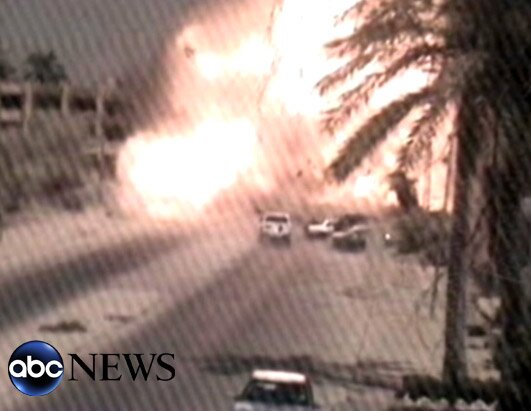First Blackwater Battle Photos

See the Blotter’s photo essay
Blotter’s story here.
Private Security Contractors: The Reality on the Ground
Stratfor:
A report issued Sept. 27 by the U.S. House Committee on Oversight and Government Reform faults private U.S. security contractor Blackwater for its performance during a 2004 mission in Iraq. The report comes amid controversy over an incident that occurred Sept. 16, in which a Blackwater team allegedly killed several Iraqi civilians during a shootout with insurgents in central Baghdad.
Having been commissioned in February, the report does not address the Sept. 16 incident, but rather faults the company’s operations in Al Fallujah in 2004 — saying those faults led to the deaths of four Blackwater employees. Separately, U.S. officials and other security contractors also claim Blackwater has been involved in a far higher number of shootings while guarding U.S. diplomats in Iraq than have other security firms providing similar services. According to U.S. State Department data, Blackwater teams used force 56 times in more than 1,800 convoy missions from January to September. Comparable figures were unavailable, but another security contractor, DynCorp International, reported 32 shootings during about 3,200 convoy missions in 2005, and 10 shootings during about 1,500 missions the following year.
These reports and statements make Blackwater look bad, though they fail to account for the frequency of its particularly dangerous missions. Because of the nature of the convoys and motorcades being escorted by Blackwater — typically those involving U.S. government officials — its contractors are exposed to more hostile action than those from other companies. The other security contractors in Iraq have far fewer personnel authorized to escort U.S. State Department motorcades.
All convoy and motorcade escort operations in Iraq’s urban battlefield are dangerous and complex. Communications often are confused and incomplete, making it difficult for commanders who are not on the scene to have a clear understanding of the tactical situation. An analysis of the Sept. 16 incident shows that such a breakdown in command, control and communications ended with the shootings.
After the initial attack, the first Blackwater team exited the area, following standard motorcade escort procedure. However, a second Blackwater team that was nearby was sent in to assist the first team after it had already left the area, likely because word that the initial team was safe failed to reach Blackwater’s command post — and thus the dispatched reaction team — in time.
This resulted in a second team of contractors being inserted into an already tense situation. Further complicating the situation was the presence of Iraqi police on the scene. Insurgents in Iraq often have carried out operations while wearing the uniforms of the Iraqi police, and in many cases Iraqi police have used their uniforms and equipment to carry out attacks against sectarian or political rivals. In short, U.S. personnel in Iraq — both soldiers and contractors — do not trust the Iraqi police or consider them reliable allies. The presence of several armed Iraqi police with drawn weapons at the scene of the attack did little to relax the contractors to relax their guard. At some point after the second team was inserted into the situation, somebody started shooting.
More incidents like the Sept. 16 firefight undoubtedly will occur, especially if the United States makes a substantial reduction in its troop presence in major Iraqi cities during the next couple of years and the Iraqi government does not step in to create some order. Moreover, Iraq will have to be rebuilt eventually. Civilian companies, with U.S. firms likely in the majority, will do the work — and they will use private security contractors for protection. With less of an armed U.S. presence in the country over time, contractors will have to rely even more on themselves to get out of bad situations. This means that their already low threshold for using force will get even lower.
When these incidents happen, they will cause temporary controversy regarding security contractors, but that will not change the core issue that contractors are necessary and will remain a prominent feature of the Iraqi landscape for years to come.



 Be respectful of others and their opinions. Inflammatory remarks and inane leftist drivel will be deleted. It ain’t about free speech, remember you’re in a private domain. My website, my prerogative.
Be respectful of others and their opinions. Inflammatory remarks and inane leftist drivel will be deleted. It ain’t about free speech, remember you’re in a private domain. My website, my prerogative. If you can't handle using your real email address, don't bother posting a comment.
If you can't handle using your real email address, don't bother posting a comment.
I don’t see shit. What I see is a few pics and an ABC news editor’s views of an incident that they did not witness.
Here’s my view:
Fire all the contractors and send them home, and let the Iraqis or the US military take over their operations.
- Or -
September 28th, 2007 at 4:22 pmShut the fuck up LMSM.
Its a fair assessment and clears all wrong doing in my mind … case closed
September 28th, 2007 at 6:03 pmDan - I like option #2 better!
September 28th, 2007 at 10:58 pm